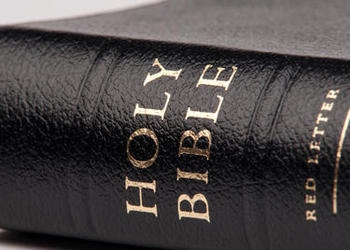The Bible, the Truth, and The History Channel

As a child, I would read books and watch movies describing a Utopian society. I was fascinated by their depiction of a future lifestyle of ease and prosperity. Although the world we live in is certainly not perfect or Utopian, it does offer us the convenience of push-button operation for activities that used to require hard work and a strong body. We no longer have to trek down to the river for a bucket of water, wash our clothing at the river's edge with a rock, or ride a horse into town.
Along with the conveniences of this society we are now able to gain knowledge through the internet, viewing our television, and listening to the radio. Do we believe what we read on the internet, see on television, or hear on the radio, without checking the facts?
On March 3, 2013, the History Channel began a series titled "The Bible," with a two hour special. My husband and I were excited about watching this show and sat down in front of our television. One of the first things shown was Noah on the Ark, as he calmed the fears of what appeared to be a representation of his family. Among many other issues with this scene was the poor construction of the Ark. It was leaking water from above and through a hole which had been ripped in its side. I hoped this was a small issue and the producers of the series would stick to their claims of accuracy. As the show continued I found my hopes for accuracy were dashed.
One of the most disappointing aspects was not the inaccuracy of the show as much as the way it was received by those who watched it. Having its own Facebook page allowed people the opportunity to comment on the show and give their thoughts on it. While there were a few who felt as I did, the majority of people left positive reviews and comments. Many felt as if the show had accurately portrayed the Bible as they knew it. It makes me wonder how many people actually read their Bible. Did you watch the show? Did you think it offered a true depiction of the people and events described within its pages? Did you open your Bible and check the facts?
The only way to truly know what is in your Bible is to read it. Studying your Bible will help you discover more about God and develop a closer relationship with Him. You will begin to understand what He finds important and how you can live in a way that is pleasing to Him.
Do you know how to study your Bible? Here is a link to a free Bible study course. These Bible study guides are designed to help you learn the truth as you journey through God's Word. They will help you learn how to study the word of God and how to develop the ability to know what is really in the pages of your own Bible. Knowing what your Bible really says will give you an advantage when others try to tell you what they think it says.
